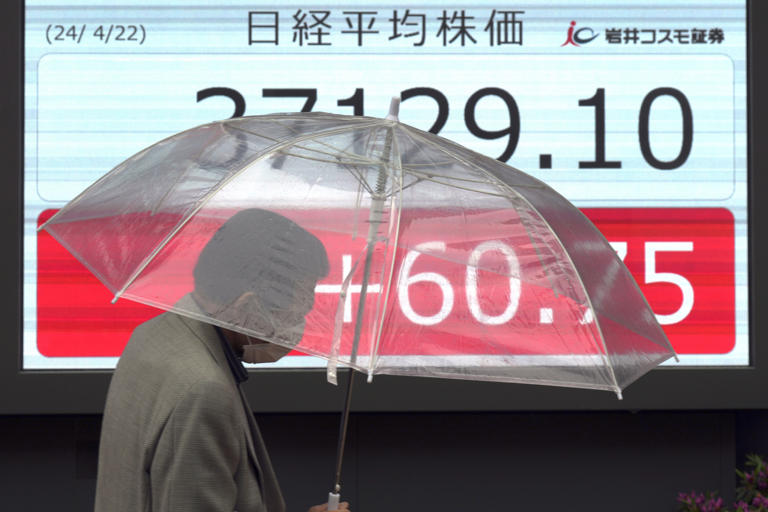Over the weekend, Asian markets diverged from the negative tone on Wall Street, displaying resilience and registering broad gains, with the exception of the Shanghai Composite index, which experienced a modest decline. This contrasted with the backdrop of a challenging week for major technology stocks in the U.S., as they logged their worst performance since the COVID-induced market crash in 2020.
Hong Kong’s Hang Seng index led the regional gains, surging by 1.6% to reach 16,489.08 points. However, the Shanghai Composite index shed 0.5%, closing at 3,050.89 points, following the decision by the People’s Bank of China to keep its 1-year and 5-year loan prime rates unchanged.
In Japan, the Nikkei 225 index added 0.4%, closing at 37,219.47 points, accompanied by a further weakening of the yen. This currency movement saw the U.S. dollar strengthen against the yen, reaching levels not witnessed since 1990, trading at 154.69 yen compared to the previous level of 154.59 yen.
South Korea’s Kospi index experienced a notable jump of 0.8%, reaching 2,613.61 points, signaling positive sentiment among investors in the region. Similarly, Australia’s S&P/ASX 200 surged by 1% to reach 7,640.30 points, contributing to the overall optimistic sentiment observed in Asian markets.
The previous Friday saw the S&P 500 index facing a decline of 0.9%, marking its third consecutive week of losses. Closing at 4,967.23 points, this represented a 5.5% decrease from its recent record high set at the end of the previous month, marking the longest losing streak since September.
While the Dow Jones Industrial Average managed to register a slight increase of 0.6%, reaching 37,986.40 points, the Nasdaq composite saw a notable decline of 2%, closing at 15,282.01 points. This decline was particularly pronounced in several prominent tech stocks, including Super Micro Computer and Nvidia, reflecting broader weakness in the technology sector.
The poor performance of tech stocks was exacerbated by concerns among investors regarding persistently high interest rates. Despite earlier expectations of potential rate cuts by the Federal Reserve, recent statements from top Fed officials indicated a likelihood of maintaining high interest rates for an extended period. This dampened investor sentiment, particularly affecting tech stocks perceived as overvalued and reliant on future growth prospects.
Amidst these challenges, companies faced increasing pressure to deliver growth in profits, with interest rates offering little relief in the near term. Despite some positive earnings reports, such as those from American Express and Fifth Third Bancorp, the overall market sentiment remained cautious.
In the oil market, U.S. benchmark crude oil experienced a decline, shedding 68 cents to reach $81.54 per barrel on the New York Mercantile Exchange. Similarly, Brent crude oil gave up 72 cents to reach $86.57 per barrel, following concerns about escalating tensions in the Middle East.
Overall, while Asian markets demonstrated resilience and shrugged off the negative sentiment from Wall Street, ongoing challenges, including concerns over interest rates and geopolitical tensions, continued to weigh on investor sentiment and market dynamics.
